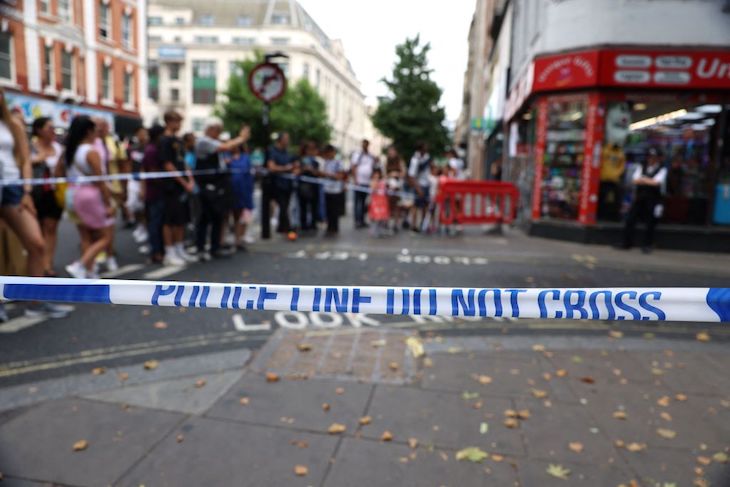The appearance of vigilantes on the streets of Bournemouth certainly represents a worrying development. What is less widely-known is that civilian law enforcers have also started to appear on the streets in London.
London is now exhibiting much the same problems that have been in incubation elsewhere for years
I only became aware of this on Monday when walking up Tottenham Court Road. There in the afternoon I spotted two personnel clad in orange patrol vests emblazoned with the words ‘Street Warden’ (deployed, as it explained at the dorsal base, by the Fitzrovia Partnership, an organisation that works with local businesses) questioning three youths who, to judge by the expression and tone of their interrogators, had been up to no good. The wardens then proceeded to have a word with a pavement beggar, advising him to keep his begging cup free from the path of pedestrians.
At any other point in recent years this wouldn’t be regarded as an unusual sight, given the growing consensus that crime in London is out of control. Yet we live in unusual times right now, perhaps in the midst of a crisis, as the emergence of the self-styled ‘Safeguard Force’ in the Dorset seaside town attests.
What I witnessed would suggest that rather than being exceptional, London today is in-step with trends elsewhere in the country. That there have been anti-migrant disturbances in Ballymena, in Northern Ireland, this summer, and that the incidence of putting up – and taking down – flags has spread to Tower Hamlets in the capital, would confirm that we really do live in one United Kingdom of Great Britain and Northern Ireland.
That patriotic flags have started to spring up in Tower Hamlets, of all places, undermines the assumption that London is abnormal, being vastly more foreign and alien than the rest of the country. Thus, some might even welcome the fact that English and British flags are now being unfurled on the streets there, evidence that our capital city is being reclaimed by discontented indigenous population, tangible proof that the populist wave is manifesting itself conspicuously and with confidence. Similarly, the arrival of street wardens has been deemed to signal that ordinary people are taking back control of their beleaguered neighbourhoods.
Yet these twin, related developments are nothing to celebrate. They are not solutions to our problems, but symptoms of grave and profound problems.
For sure, it may be blessed short-term relief for some that civilian law enforcers have arrived on our streets, but it should be no cause for joy. Some New Yorkers might have felt similar comfort to see the Guardian Angels arrive on their subway trains in the 1970s, but most also recognised it as a desperate response to a city that had reached a nadir.
Likewise, some might rejoice that the ethnic English now feel sufficiently bold to assert themselves after decades of neglect and opprobrium. Yet the fact that photographs of southwest Birmingham or east London now recall past images of loyalist east Belfast should also arouse disquiet. With a profusion of Palestine flags across the land also denoting the establishment of ethnic fiefdoms administered by ‘community leaders’, we are witnessing the partition of urban landscapes into territories along sectarian lines.
London is now exhibiting much the same problems that have been in incubation elsewhere for years. This is because, despite all the capital’s indisputable differences in comparison to the rest of the UK, problems that arise by dint of being an international city with a large multi-ethnic, multi-racial compositions (other international cities like New York and Paris have been beset by comparable problems), London is like the rest of the country in many respects. It is neither the hellhole that many outside the capital are lead to believe, nor is it the Elysium that some liberals who seldom seem to venture beyond their affluent, white North London enclaves would have us believe.
London, Birmingham, Bournemouth, Ballymena: these are all places bearing the unmistakable signs of a nation-state seemingly on the precipice, thanks to a breakdown in law and order, a surge in both legal and illegal immigration and the fragmentation of intercommunal relations.
For years we were told to celebrate multiculturalism unreservedly. While most still abide to a tolerant, liberal attitude in regard to living alongside different peoples in the same country, only a remote elite still cling to multiculturalism as a state-promoted ideology, one that only leads to more division.
Some, including many in the police, still also advocate the notion that shoplifters and other criminals resort to their actions out of desperation, or even as a form of readdressing the iniquities of capitalism. The shibboleth that criminals are victims must be jettisoned, as must the constant sneering and condescension towards the English working class by complacent, insulated liberals. Both these misguided attitudes have been key in bringing about today’s woeful – and nationwide – state of affairs.
